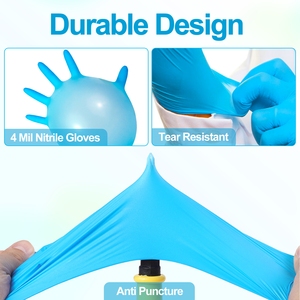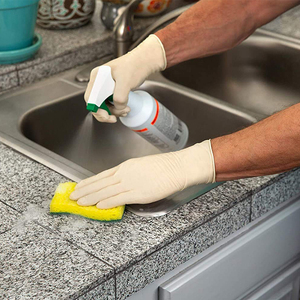
All categories
Featured selections
Trade Assurance
Buyer Central
Help Center
Get the app
Become a supplier

(2347 products available)




















































Natural Rubber Latex
As the name suggests, examination gloves are made of natural latex. Natural latex is a highly elastic and durable material. Therefore, it provides humans with flexibility and sensitivity. These properties make them ideal for delicate tasks such as medical examinations.
Cornstarch Powder
The powdered inner coating of latex examination powdered gloves consists of cornstarch. It helps to lubricate the gloves during their wear. That makes it easier for the gloves to slide onto the hands, especially in situations where they tend to be damp. The powder aids in moisture absorption. Therefore, it ensures that the latex gloves remain dry and comfortable to wear for extended periods.
Vinyl Material
In today’s world, all latex gloves are not created with latex alone. Some options are made with synthetic gloves consisting of PVC or vinyl. PVC, which is polyvinyl chloride, is less elastic as compared to latex. However, due to its affordability and hypoallergenic properties, it is widely used. This becomes particularly important for people with allergies to natural latex.
Nitrile
Nitrile rubber is a synthetic material. It closely resembles the elasticity and strength of natural rubber latex. Nitrile gloves are a preferred option for people who tend to have sensitivities or are allergic to natural latex. Nitrile is known for its puncture resistance. This property makes it a safe option in medical and clinical environments.
Polymer Coating
Organic materials and synthetic rubber gloves often have a thin chemical coating on their inner surfaces. They include materials like polyethylene or polymer blends. These coatings make it easier for the user to don the gloves. They also help in preventing the gloves from sticking together during storage. These coatings serve as an effective lubricant alternative for powdered latex examination gloves.
Latex examination gloves have a wide range of applications, especially in medical and healthcare settings.
Medical Examinations
Their primary use is in their ability to protect healthcare professionals and patients during medical examinations. They provide a reliable barrier against germs, bacteria, and bodily fluids. Therefore, enabling doctors and nurses to carry out their tasks safely and hygienically. Moreover, their elasticity allows for a snug fit. This ensures that medical personnel retain calm and pinpoint touch and sensitivity while conducting procedures.
Dental Procedures
Dental professionals use allergic latex examination gloves during dental procedures. They add to the maintenance of infection control. They protect patients and dental staff from potential cross-contamination. Also, their durability makes gloves ideal for performing tasks that require precision, such as using dental tools, which are critical in ensuring procedures’ safety and hygiene.
Laboratory Work
In laboratories, researchers and technicians use disposable latex gloves during experiments and testing. The gloves ensure chemicals, biological agents, and hazardous substances do not come into contact with skin. They are particularly well-suited for tasks that require dexterity, such as handling delicate instruments or samples. They are an integral part of maintaining safety in laboratory environments.
Home and Industrial Use
Even though latex gloves have more specific applications in medical and laboratory settings, they are also used in general home and industrial settings. They are used to handle chemicals and hazardous materials in industrial settings. They are also used to do tasks that require cleanliness and sterility, such as food handling. However, people might opt for powder-free options in some situations. This is particularly prevalent in situations where there are potential latex allergies.
Veterinary Medicine
In veterinary medicine, latex examination gloves are used to ensure pets’ health and hygiene during examinations and treatments. Like healthcare and dental settings, they maintain infection control while giving practitioners the dexterity to perform intricate procedures. This makes them essential tools for veterinarians.
The long-lasting latex disposable gloves and their care play a crucial role in their performance and reliability in medical environments.
High Durability
One of the main advantages of natural latex materials for examination gloves is their remarkable elasticity. This elasticity allows them to stretch and mold themselves to the shape of the hand. It provides a snug yet flexible fit. Their durability comes from this elasticity, which enables the gloves to endure intricate tasks without ripping or tearing. This means that nurses and doctors can use them for delicate medical procedures and tests without worrying that they will break down in the middle of their work.
Resistance to Tears and Punctures
In addition to their elasticity, latex examination gloves have a high resistance to punctures and other tears. This resistance is critical in medical environments. There is a need to protect against sharp instruments, needles, or other medical equipment. Thus, these gloves are designed to provide reliable protection against potential hazards while maintaining the necessary flexibility for intricate tasks.
Proper Storage
The key to maintaining the durability of these gloves lies in proper storage. These gloves must be kept in cool, dry places that are out of direct sunlight. Excessive heat and humidity can degrade the rubber material. This leads to increased chances of tearing and decreased elasticity. Proper storage ensures that the gloves remain strong and effective for their intended use. Therefore, medical facilities need to practice this aspect of care to ensure the long-lasting functionality of this hospital product.
Expiration Dates
It is important to note that latex examination gloves come with an expiration date. This happens because, over time, the materials degrade even under ideal storage conditions. Hospitals and clinics need to be vigilant in checking these dates. This ensures that the gloves are effective and safe because using expired gloves can compromise medical procedures and pose risks to patients.
Proper Donning and Doffing
To maintain the integrity of latex examination gloves, proper donning (putting on) and doffing (taking off) is necessary. If they are put on or taken off carelessly, the gloves may become soiled by an outside substance. It compromises their sterility. Also, improper handling may cause accidental exposure to contaminants. So, the procedures should be followed to minimize contamination during this process. That helps in maximizing the life span of the gloves.
Medical Facilities
Hospitals, clinics, and other healthcare settings typically have a large demand for sterile latex examination gloves. They especially go for those that are powdered for easy donning. To meet quality and safety standards, one must ensure that the supplies come from a reputable source. Therefore, one should focus so much on the reliability of the supplier. It is because medical institutions require consistent supplies with guaranteed sterility.
Pharmaceutical Companies
Pharmacies and healthcare distributors play a crucial role in fulfilling the demand for medical supplies. They seek out durable and competitively priced latex examination gloves. When purchasing in bulk, cost-effectiveness becomes essential. Therefore, deals such as wholesale prices and bulk discounts become attractive. Also, pharmacies prioritize gloves that satisfy regulatory requirements because it ensures universal health and safety standards.
Dental Practices
Dental clinics and practices use examination gloves during patient examinations and procedures. Therefore, they look for gloves that provide a high level of tactile sensitivity and comfort. They also pay attention to the material thickness of the gloves because it directly affects their durability. It ensures gloves withstand rigorous tasks in dental care.
Beyond healthcare, other industries requiring precision and hygiene also use these gloves.
Laboratory and Research Facilities
In industries like pharmaceuticals and biological research laboratories, people commonly handle hazardous chemicals and biological agents. So, they require latex examination gloves as protection during experimentation. They value gloves where there is chemical resistance. It adds a layer of safety to their operations. Also, considering how comfortable the gloves will be during long hours of use is paramount.
Veterinary Clinics
Veterinary practices require gloves that assure infection control and patient safety. They prioritize materials that give them good sensitivity. It allows them to perform delicate procedures on animals. Vet clinics seek suppliers that provide gloves quickly and offer varieties.
The powder in the latex examination powdered gloves acts as a lubricant. It makes it easier to put the gloves on. It reduces moisture absorption. Therefore, the gloves feel drier and are generally more comfortable during extended wear. This powder assists professionals in quickly donning gloves. It is important in fast-paced environments like hospitals and clinics. Latex gloves are favored for their exceptional elasticity. It ensures a firm fit and great tactile sensitivity. Their superior strength and durability also make them ideal for intricate tasks. Hospitals prefer them for surgical procedures, medical examinations, and diagnostic tasks.
Most of these gloves are manufactured with natural latex. The material provides great elasticity. Therefore the gloves have a very comfortable stretch. They also give practitioners a very good tactile sensitivity. So, they are suitable for delicate tasks that are critical in healthcare and laboratory environments. These disposable gloves also have a low-risk potential for contamination. Practitioners can safely use them in sensitive settings. They are commonly thick enough to ensure they are durable when performing delicate procedures. Practitioners also enjoy additional safety while using these gloves, as they are treated and tested to prevent the proteins causing allergies in some people.
The variance in sizes and availability is one of the most significant considerations when deciding to stock these gloves. It is an important aspect since practitioners require variety to meet different individual needs. So, whether one is purchasing small, medium, large, or extra-large sizes, make sure they stock all the varieties. Practitioners do demand them so that they can find the ideal fit. It will also affect comfort and dexterity. Therefore, distributors must ensure they offer a complete range. It ensures their customers have access to the diversity. It enhances the gloves' functionality and effectiveness in healthcare and other settings.
Latex examination gloves are indeed available in various thicknesses. It ensures they cater to a wide range of applications. Various thicknesses provide varying levels of sensitivity and durability. The thinner the gloves, for example, 3 mils, will provide better sensitivity. Therefore, they are best for tasks like medical examinations. On the other end of the spectrum, thicker gloves, up to 7 mils, are preferred in situations requiring greater protection or handling of harsh chemicals. They balance comfort and safety. It is why many manufacturers make them available in various thicknesses to meet end-users’ diverse needs and preferences.
Lately, examination powdered gloves should be kept in cool, dry areas away from direct sunlight. Moderating these temperatures will keep the materials' integrity. One should also avoid keeping the examination glove package near things that emit ozone, such as motors and electric heaters. Store them in a manner that does not put unnecessary pressure on them. This care will prevent breaking and tearing. Medical centers should also keep their stock in low-humidity zones. They will ensure there is no adverse effect on the latex material. These simple storage practices will enable other people to benefit from the gloves’ quality and safety.